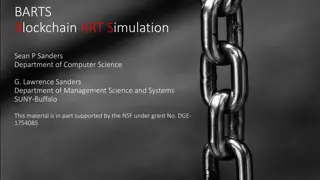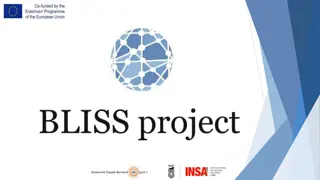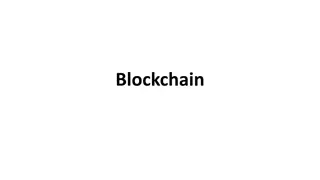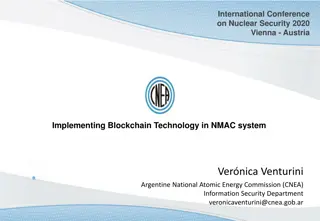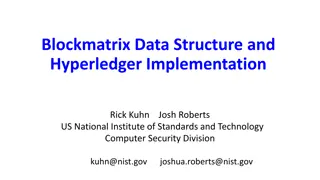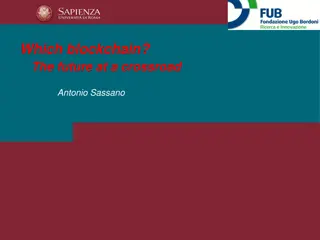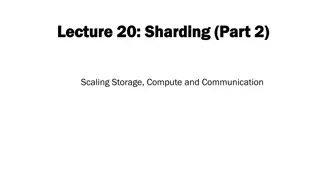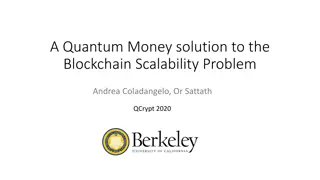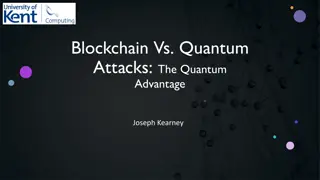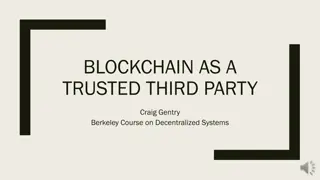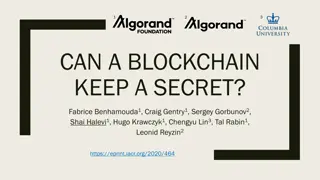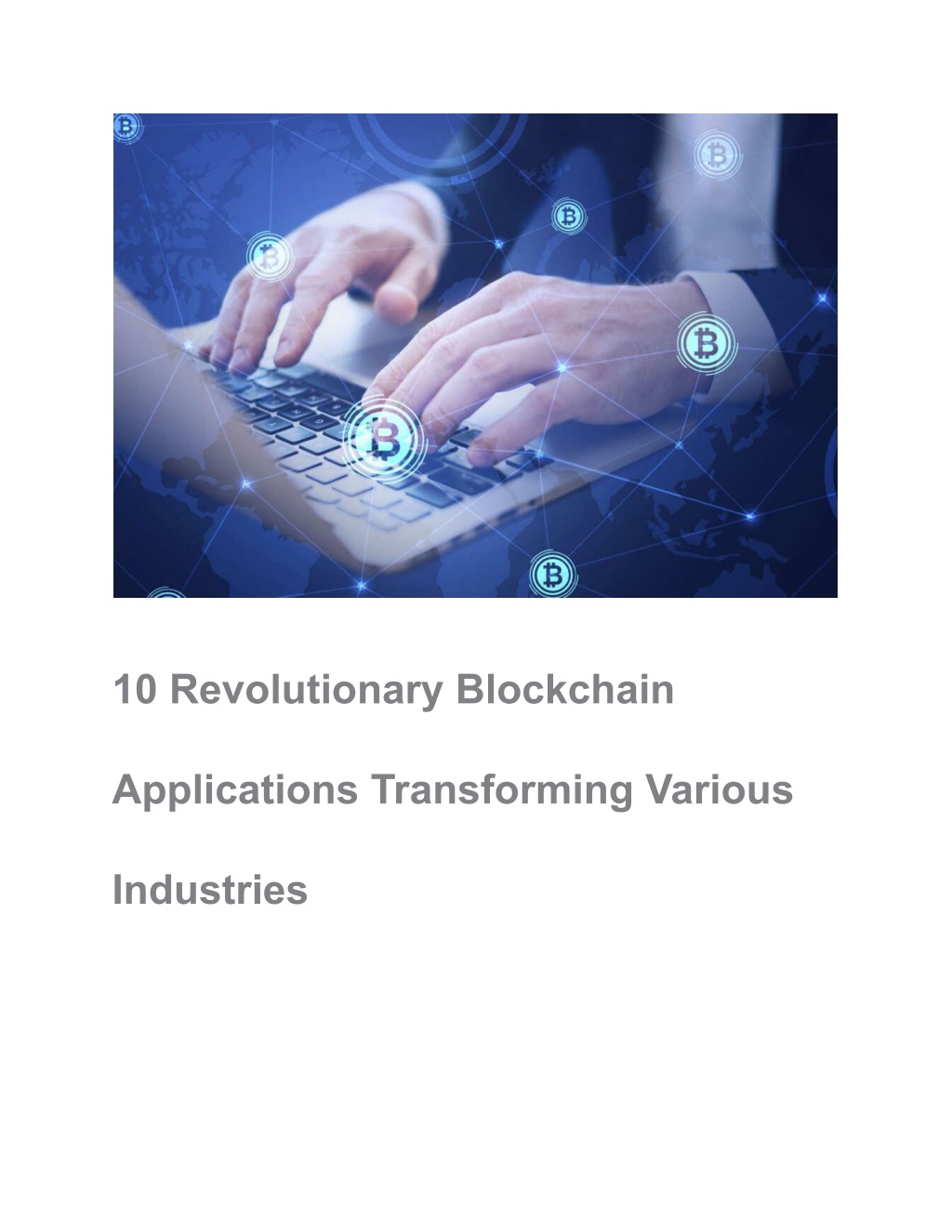
10 Revolutionary Blockchain Applications Transforming Various Industries
Blockchain technology has gained tremendous traction across various sectors, evolving from a niche concept to a revolutionary tool that promises to transform industries. While initially popularized by cryptocurrencies like Bitcoin, blockchain's decen
Download Presentation

Please find below an Image/Link to download the presentation.
The content on the website is provided AS IS for your information and personal use only. It may not be sold, licensed, or shared on other websites without obtaining consent from the author. Download presentation by click this link. If you encounter any issues during the download, it is possible that the publisher has removed the file from their server.
E N D
Presentation Transcript
10 Revolutionary Blockchain Applications Transforming Various Industries
Introduction to Blockchain Applications Blockchain applications are a decentralized, distributed ledger system that records transactions in a secure, transparent, and immutable way. It operates on a network of computers, or nodes, which validate and record transactions independently. Key Concepts in Blockchain: 1. Blocks and Chains: A block is a group of transactions or data. A timestamp, a list of transactions, and a link to the block before it are all included in each block, creating a chain. The term blockchain refers to the chronological and unchangeable record of all network transactions that are created when blocks are linked together. 2. Decentralization:
Unlike traditional centralized systems where data is stored on a single server or a group of servers controlled by one entity, blockchain applications operate on a decentralized network of computers (called nodes). Each node has a copy of the entire blockchain, ensuring that no single point of failure or control exists. 3. Consensus Mechanisms: Consensus processes are used by blockchain applications to approve transactions and add them to the ledger. The most common consensus algorithms include: Proof of Work (PoW): Used by Bitcoin, where nodes (miners) solve complex mathematical puzzles to validate transactions. Proof of Stake (PoS): Used by Ethereum 2.0, where validators are chosen based on the number of coins they hold and are willing to stake as collateral. 4. Cryptography: Blockchain applications use cryptographic methods to regulate the generation of new blocks and safeguard transactions. Each transaction is encrypted, and the chain of blocks is secured using cryptographic hashes that make altering past data computationally infeasible. 5. Smart Contracts: A smart contract is a self-executing agreement that has its terms encoded directly into computer code. When certain criteria are satisfied, smart contracts automatically enforce and carry out their terms, doing away with the need for middlemen. Key Features: Decentralization: Because no one party has complete control over the data, tampering is less likely. Transparency: All network users may view and record transactions.
Immutability: Once added, transactions cannot be altered or deleted. How it Works: 1. Transaction Initiation: A transaction is created and broadcast to the network. 2. Validation: Nodes validate the transaction using consensus mechanisms. 3. Recording: The transaction is added to a block after it has been verified. 4. Consensus: The block is added to the existing blockchain applications after reaching a consensus. Blockchain ensures data integrity and security across various applications. Blockchain in Finance: Enhancing Security and Efficiency Blockchain applications revolutionize the finance industry by providing unparalleled security and operational efficiency. By leveraging decentralized ledgers, financial institutions can:
Reduce fraud with tamper-proof transaction records Enhance cross-border payment speeds and lower associated costs Enable real-time auditing and regulatory compliance Improve transparency with immutable and traceable financial data Fintech companies are also utilizing smart contracts to automate transactions, eliminating the need for intermediaries. Blockchain application s ability to ensure data integrity and streamline processes fundamentally transforms how finance operates. Increased dependability and confidence in financial transactions result from this. Supply Chain Management: Ensuring Transparency and Authenticity
Blockchain applications play a pivotal role in modernizing supply chain management, providing unprecedented transparency and authenticity. It enables precise tracking of goods from their origin to final delivery. Enhanced Traceability: Every transaction recorded on the Blockchain applications ensures that all parties can track the progress of goods. Fraud Prevention: Immutable ledger records deter fraudulent activities by documenting every step in the process. Real-time Updates: Blockchain applications offer instant updates on the status and location of shipments. Cost Efficiency: Automating processes reduces administrative costs and increases operational efficiency. Blockchain applications ensure a more transparent, secure, and efficient supply chain management system. Healthcare: Revolutionizing Data
Security and Patient Care Blockchain technology is transforming healthcare by enhancing data security and improving patient care. Key applications include: Secure Data Sharing: Blockchain applications ensure patient data is shared securely among healthcare providers, reducing the risk of data breaches. Interoperability: It enables seamless exchange of medical records between different healthcare systems, fostering better collaboration. Patient-Centric Models: Patients gain control over their data, improving trust and transparency. Clinical Trials: Blockchain applications enhance the integrity of clinical trial data with immutable, timestamped records. Drug Traceability: The technology tracks pharmaceuticals throughout the supply chain, ensuring authenticity and preventing counterfeiting.
Real Estate: Simplifying Property Transactions Blockchain applications is reshaping real estate, enhancing transparency and efficiency. Key benefits include: Immutable Records: Blockchain applications ensure all property transactions are permanent, verifiable, and transparent. Reduced Fraud: Digital ledgers eliminate tampering, thereby decreasing fraud risks. Smart Contracts: Automated enforcement of contract terms facilitates quicker transactions without intermediaries. Tokenization: Real estate assets can be divided into tokens, enabling fractional ownership and increased liquidity. Cost Reduction: Eliminating middlemen significantly reduces costs associated with property transactions. Overall, Blockchain applications provide a more streamlined and secure approach to buying, selling, and managing properties.
Identity Verification: Securing Personal Data Identity verification stands as a critical application of blockchain applications, ensuring the secure handling of personal data. Blockchain s immutable ledger offers: Tamper-proof Records: Each entry is cryptographically secured, preventing unauthorized modifications. Decentralized Storage: By distributing data across multiple nodes, it reduces risks associated with single points of failure. User Control: Individuals have more control over their identity data, mitigating risks of identity theft and fraud. Transparency and Trust: Public verification without compromising sensitive information enhances trust between entities. Streamlined Onboarding: Enables quicker and more efficient identity verification processes, minimizing bureaucracy.
Energy Sector: Empowering Decentralized Energy Grids Blockchain applications are revolutionizing the energy sector by enabling decentralized energy grids. It facilitates peer-to-peer energy trading, allowing consumers to buy and sell excess energy directly. Transparency: Transparent and unchangeable transaction records are guaranteed by blockchain. Security: Enhanced security measures protect against tampering and cyber threats. Efficiency: Smart contracts automate transactions, reducing operational costs. Decentralization: Reduces reliance on centralized power companies.
Blockchain empowers individuals to manage their energy sources more efficiently. Renewable energy sources like solar and wind can be seamlessly integrated, promoting sustainable energy practices. Voting Systems: Enhancing Democracy with Blockchain Blockchain technology offers secure, transparent, and tamper-proof voting systems, addressing the limitations of traditional methods. It provides: Security: Blockchain ensures encrypted, immutable records, eliminating risks of voter fraud and result manipulation. Transparency: Real-time public ledgers verify each vote, promoting trust and accountability. Accessibility: Enables remote, digital voting, increasing participation, particularly for disabled or remote voters. Efficiency: Reduces administrative costs and time, as blockchain automates vote counting and result verification.
Anonymity: Safeguards voter privacy while ensuring the authenticity of each vote through cryptographic techniques. These features bolster democratic processes and enhance voter confidence. Smart Contracts: Automating Legal Agreements Smart contracts enhance efficiency by executing predefined conditions without intermediaries. These self-executing contracts, developed on blockchain platforms like Ethereum, ensure transparency and security. Key Benefits: Automation: Reduces manual intervention. Accuracy: Minimizes errors due to automated enforcement. Security: Utilizes robust cryptographic mechanisms. Applications: 1. Real Estate: Facilitates property transactions efficiently.
2. Supply Chain: Tracks and verifies logistics processes. 3. Insurance: Automates claim processing. 4. Legal: Simplifies contract management and enforcement. These uses highlight how smart contracts can revolutionize several industries. Intellectual Property: Protecting Digital Rights The protection of intellectual property is being revolutionized by the introduction of blockchain technology. Blockchain offers a decentralized ledger, providing transparent and immutable records for intellectual property. Key Benefits: Timestamping: Creators can timestamp their work, establishing a verifiable creation date. Ownership Verification: Blockchain enhances the verification of rightful ownership, reducing disputes over intellectual property.
Smart Contracts: These automate licensing agreements, ensuring that royalties are distributed automatically according to pre-defined terms. Decentralization: Eliminates the need for intermediaries, which reduces costs and improves efficiency. Blockchain technology promises to offer robust solutions for safeguarding digital rights transparently and efficiently. Gaming Industry: Changing the Landscape of Game Development Blockchain technology is revolutionizing the gaming industry, introducing new paradigms in game development. Key changes include:
Decentralized Game Economies: Empowering players with genuine asset ownership through Non-Fungible Tokens (NFTs). Enhanced Security: Protecting game inventories and transactions from fraud and hacking. Interoperable Assets: Facilitating the transfer of in-game items across different games and platforms. Transparent Transactions: Ensuring clarity and fairness in microtransactions and trade. Player-driven Markets: Enabling players to trade assets without intermediaries. Reward Systems: Implementing blockchain for transparent and tamper-proof reward disbursement. These innovations reshape player engagement, fostering new business models and creating a more immersive gaming experience. Retail: Transforming Customer Experiences Blockchain technology is reshaping the retail sector by enhancing customer experiences and operational efficiency. Key areas include: Supply Chain Transparency: Blockchain offers unalterable records, allowing consumers to trace product origins and verify authenticity. Loyalty Programs: Retailers use blockchain for more secure, flexible, and personalized loyalty rewards.
Payment Security: Integrating blockchain ensures secure, speedy transactions, reducing fraud and chargeback risks. Data Privacy: Blockchain empowers customers to control their data, enhancing trust and compliance with data protection regulations. Inventory Management: Real-time tracking via blockchain minimizes losses and streamlines stock replenishment processes. Agriculture: Boosting Transparency and Sustainability Blockchain technology revolutionizes the agriculture industry by ensuring transparency and enhancing sustainability. Supply Chain Transparency: Farmers and consumers can track every stage of the agricultural supply chain through blockchain records, reducing fraud and increasing trust. Efficient Resource Management: Accurate data on resource usage aids farmers in optimizing water, fertilizers, and pesticides, leading to more sustainable farming practices.
Smart Contracts: These facilitate automatic payments upon delivery of goods, reducing delays and administrative costs. Traceability: Detailed records on crop origins ensure food safety and quality, allowing consumers to make informed choices. Fair Pricing: Blockchain enables fair trade practices by providing proof of fair pricing negotiations between farmers and buyers. Insurance: Streamlining Claims and Reducing Fraud Blockchain technology is significantly enhancing the insurance industry by introducing transparency and efficiency. Claim Automation: Smart contracts ensure automatic claims processing, minimizing human intervention and errors. Data Integrity: Immutable ledgers maintain accurate and tamper-proof records, reducing fraudulent claims. Enhanced Verification: Real-time data sharing between insurers and customers facilitates rapid verification of claims.
Risk Management: Blockchain enables precise risk assessment by leveraging vast data points, improving policy underwriting accuracy. Cost Reduction: By eliminating intermediaries and reducing administrative costs, blockchain lowers overall operational expenses. These benefits underscore blockchain s transformative impact on insurance. Entertainment: Revolutionizing Content Distribution Blockchain technology is transforming how entertainment content is distributed. It guarantees transparent processes and equitable recompense for producers via decentralized platforms. Key benefits include: Elimination of Intermediaries: Blockchain removes middlemen, allowing creators to interact directly with audiences. Enhanced Security: Blockchain s immutable ledger protects intellectual property from piracy.
Smart Contracts: Automated payment systems ensure creators receive fair revenue shares. Tokenization: Fans can purchase tokens to support and promote their favorite artists. Global Reach: Decentralized networks facilitate worldwide content distribution without regional restrictions. These advancements democratize the entertainment industry, empowering creators and consumers alike.


